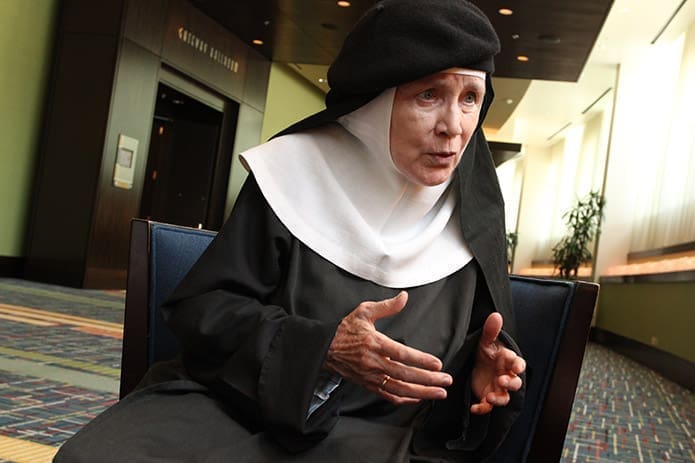 Photo By Michael Alexander
Photo By Michael AlexanderCollege Park
Mother Dolores shatters stereotypes about movies and monasteries
By GRETCHEN KEISER, Staff Writer | Published June 30, 2014
COLLEGE PARK—Mother Dolores Hart, OSB, graciously offered some remembrances of her remarkable life as she made her last public appearance before returning to the cloistered monastery in Bethlehem, Connecticut, where she has been a consecrated religious for almost 50 years.
A year away from the monastery, which began when her autobiography, “The Ear of the Heart,” was published in 2013 by Ignatius Press, concluded with her talk at the 2014 Eucharistic Congress.
Mother Dolores, who is 75, is most often described as the beautiful young Hollywood actress who, at 19, kissed Elvis in her first movie, “Loving You.” And then who, after making nine other movies, and appearing on Broadway in the play, “The Pleasure of His Company,” startled the movie world by entering a monastery.
But in her book, co-written with a lifelong friend, Richard DeNeut, a picture of Hollywood in the 1950s and 1960s emerges that is almost as startling as Dolores Hart’s famous vocational call.
There she was, a practicing Catholic, and in her own recollection, always able to find others in the movie industry who shared her beliefs.
“I really found God there,” Mother Dolores said, of Hollywood.
“I got with a circle of actors, directors and producers that had another level of consciousness,” she said. “I knew that these people would respect my way of life as a Catholic.”
One person was Maria Cooper, the daughter of actor Gary Cooper, who shared her faith in Hollywood and became a confidante in matters of faith. She later assisted at the ceremony where her friend received her religious habit.
“I was very fortunate and very much given a way,” Mother Dolores said.
“This matter of a vocation pursued me and dogged me,” she said. “There was no reason. It was a call.”
In the book, she makes clear that her life in film and on stage was engrossing and increasingly meaningful. She hoped that someone would put a roadblock in the way of this “call,” but the barriers, instead, all fell away.
In the call she felt that she needed to use her gifts and “the goodness I had known … to the benefit of the church.”
She went to the monastery for the first time to rest after a particularly grueling schedule.
“The minute I put my foot on the grounds, I knew it was home,” Mother Dolores said.
She entered a monastery with a history as dramatic as any movie script.
Regina Laudis was founded after World War II from the inspired promise of an American woman religious living in a French Benedictine monastery. Mother Benedict Duss, a medical doctor, was forced to hide during the Nazi occupation of France because she was American. When the community was liberated by the Allied Forces, she saw the American soldiers free the area and promised to come back to the United States and establish a monastery in gratitude.
Founded in 1947, Regina Laudis Abbey is currently a community of 38, with three postulants and three or four novices, said Mother Dolores, who has had the role of “dean of education” in the monastery for many years.
Mother Benedict asked her to take on the role because of her “street smarts,” Mother Dolores said.
Her life experience included growing up in a family where both parents abused alcohol and her grandparents were often the steady hands around her. She asked to become a Catholic when she was in elementary school.
Once in the monastery, the restrictions chafed and Mother Dolores wrote a letter to her superior telling her everything that she thought should be changed to make monastic life better. Mother Benedict put the letter in a drawer, but kept it, and gave it to her seven years later, asking her to implement many of the changes she’d suggested.
One was giving women considering entering the monastery a lot of latitude about how to bring their gifts into the community and how to live the life joyfully.
“We really learned that restrictions for young women wanting a vocation—don’t do this, don’t do that—would not appeal,” Mother Dolores said. “They would not respond. Innovation was the key. Using the gift God gave them.”
“Pope Francis really embodies that spirit,” she added. “It was my life in show business, in movies, that prepared me to call people to come on stage and act from their own gifts, rather than a holy reading, hoping they would find Christ in the next world.”
The monastery is a wellspring of activity, with a thriving agricultural industry of beef cattle, dairy cows, sheep, and vegetables, and an artistic outreach, guided by lay supporters, including a summer theater.
She has been greatly enriched by chant in monastic life.
“The world of chant was exciting and more beautiful than people realized,” she said. “Many of the things that come of the ancient gift of Christendom were very modern and sometimes more than what people were calling modern.”
Seemingly surrounded with caring people in a very vulnerable childhood and film career, Mother Dolores was asked whether she felt that she had been protected in a special way by the Lord.
“I always knew the situations I was going through (as a child) were very different, very hard than those of my friends,” she said.
“But eventually as I was growing up, it occurred to me, I was being cared for and I was never left without the good,” Mother Dolores said.
She advised, in everything and in everyone, “Look for the good.”